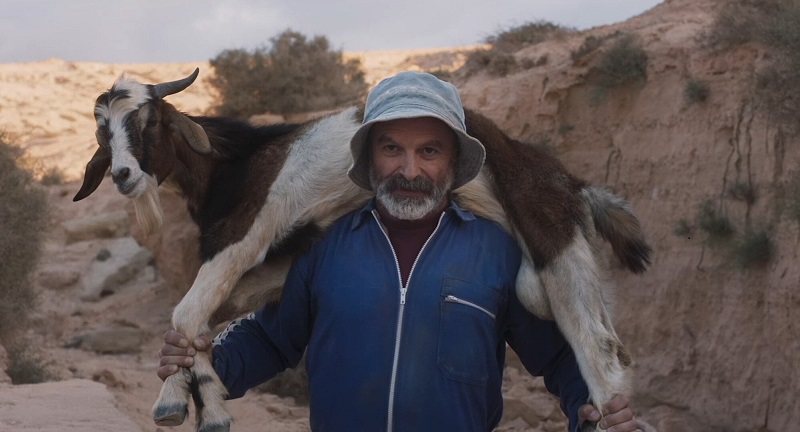➢ The film opens on Friday April 22 Canarias Cinema’s Feature Films section
➢ The Gran-Canarian filmmaker’s debut in feature-length films arrives at the festival with its commercial release in sight and after having been recognized at Seville, Barcelona and Pontevedra
➢ Pantaleón depicts a tense family story in a horizontal island without renouncing to his documentary-maker stamp and carried by a mix of amateur and professional actors: among them, his two brothers, the main characters of the drama

Las Palmas de Gran Canaria, Wednesday 20 April 2022. Fuerteventura’s pure essence. Rendir los machos (Our Father) (David Pantaleón, Spain, France, 2021, 80 min.) is the title that’ll open next Friday April 22 Canarias Cinema’s Feature Films section. And it does so by offering the audience a tense family story, a fight between two brothers perfectly interchangeable from the spectator’s point of view, as well as with such a horizontal disposition in its format and landscape as the island in which it all takes place. Gran-Canarian Pantaleón presents his film in a festival he is very familiar with and where he’s become a regular. With over 25 works to his name that include a wide selection of short films and the 2017 Festival’s Best Short Film Award for El becerro pintado, he reappears now with a work he’s been working on for the past eight years.
“I never thought it would take this long, but we’ve had the advantage of having more time to do good field work. For instance, I’ve been five or six years to Feaga, Fuerteventura’s livestock fair,” admits the filmmaker, who studied Dramatic Art and teaches acting at the Escuela de Actores de Canarias [Canay Islands’ Acting School]. His efforts have been depicted in a feature film in which his documentary-maker stamp is patently clear and whose cast includes a mix of amateur and professional actors. Its main characters are among the former, Alejandro Benito and Julio César, brothers of the director himself.
They play Alejandro and Julio Cabrera, two brothers who get on badly from a cattle and cheese-maker family that loses its patriarch. Don Guillermo’s passing, who wasn’t on speaking terms with his sons, leaves a will with a requirement: the heart of the story.
“My brothers have always helped me with my works, have been very involved in them, so I knew what I had in the film,” points out the director. “Getting them onboard was part of a pretty long process that included them. I wasn’t difficult to convince them. Although it was a bit difficult to be sure they were the right choice. But anyway, if making a film is miraculous, making it with your own family is like a miracle inside another miracle.”
The truth is both of them carry the story just like true strong characters, and share it with professional actors such as Lili Quintana or Luifer Rodríguez. “There’s something in that combination that gives the film an aura I’m interested in”, continues Pantaleón. “They have been super professional. And one needs to know the limits of the actors he’s working with. That marks a conceptual journey within the film’s own narrative. That is directing, seeing which ingredients there are and which are the conditions for putting them together in the best possible way.”
Pantaleón agrees the film “also intends to understand that world, that idiosyncrasy from Fuerteventura. We’ve tried to build that without falling into clichés and without leaving deep nuances out. Apart from the landscapes, there’s something in the film that depicts that. In fact, that dramatic silence is always there, that wind. A silence that makes an impression on you. Wind is fundamental when trying to understand Fuerteventura.”
To what extent is the drama a documentary? “The films I like, the films I’m most interested in are those that get you to look through a kid’s eyes,” explains the filmmaker, who doesn’t reveal how much truth is behind his story. “When you are little and watch cartoons you don’t consider whether they are true or false. The films I fancy the most are those in which you don’t know what’s true or false. I like limits between fiction and reality to be broken.
In any case, the director states that he “enjoyed a lot working with Amos Milbor on the screenplay, which reflects the idea of making a tale of two brothers immersed in a conflict. It is, after all, a universal story. Or something even closer to what may have happened in a family, the idea of the spiritual being broken by material things. The film talks about a tradition that sets its characters in place, with a mix of religious and economical references.”
“My brothers’ proposal was risky because they look alike so much,” admits Pantaleón. “But in the end that has been a blessing in disguise, it puts the audience in an uncomfortable situation because it is not that easy taking sides. And actually, that’s what should always happen.”
Then there is Fuerteventura’s landscape, the other protagonist of the film. A horizontal landscape that “fits very well with Fuerteventura and with the game of genres in contemporary western that is talked about so much nowadays. It is nothing but the epic transhumance of two guys moving herds in a desert. Although in the end there’s a feeling of goats being the cattle of the poor.”
In addition to all the time it took making the project, Rendir los machos has ended up having a calm maturing process due to the pandemic. “It took us in the middle of the editing process, with Darío García, and instead of crying about it, we could use the double time, 16 months, to finish it. I think that was good for the film,” admits the Gran-Canarian filmmaker.
An awarded debut
So far, the debut of Pantaleón’s feature won the AC/E Award for Best Director at the Sevilla European Film Festival, the Award for Best National Film at the Barcelona Independent Film Festival and the Audiece Award at the Novos Cinemas Pontevedra International Film Festival. Furthermore, Rendir los machos will be commercially released on June 17.
Pantaleón has come to all these events with the poster by Laura Millán, “a very powerful artist who has made, for instance, the cover for Vetusta Morla’s last album. She showed us this, which had nothing to do with what we had pretended at first, and we loved it. Receiving that proposal was very beautiful,” explains the director.
He still has a few more things to say regarding his work. A special gratitude to Vulcano Films, “that have supported all the decisions I’ve made,” and to Sebastián Álvarez. Cris Noda’s cinematography, “with whom I’ve always worked.” And Óscar Santamaría’s support as assistant director: “fundamental.” “And I could go on like this forever,” he finishes.
The Las Palmas de Gran Canaria International Film Festival, organized by the Culture area of the Gran-Canarian capital’s City Council through Promoción de la Ciudad de Las Palmas de Gran Canaria, has received public assistance by the ICAA [Institute of Cinematography and Audiovisual Arts] and the program for the internationalization of Spanish culture, PICE Visitantes, of Acción Cultural Española (AC/E).
Among the Festival’s collaborators we may find Cinesa El Muelle, El Muelle Shopping Center, Hotel Cristina by Tigotan, the Elder Museum of Science and Technology or Casa África, places which also function as seats or hold activities; as well as other institutions and companies such as Audiovisuales Canarias, Music Library & SFX or the International Bach Festival. Likewise, its market, MECAS, has been possible thanks to the sponsorship of the Gran Canaria Film Commission-Sociedad de Promoción Económica de Gran Canaria and the support of Canary Islands Film and Proexca.
The University of Las Palmas de Gran Canaria, the Mid Atlantic University, the Audiovisual Cluster of the Canary Islands, CIMA Canarias, the Asociación Microclima Cineastas de Canarias [Association of Filmmakers of the Canary Islands ‘Microclima’] and Repeople are also collaborators of the Festival.
Share this Post
